Premium Only Content

California Worst Oil Spill In Decades, Worlds Largest Commodity Traders Face Massive Margin Calls
Subscribe to grow at home http://youtube.com/c/growathome
follow our backup channel
http://bit.ly/odyseesru
http://silverreportuncut.com
Subscribe to the SRU podcast
http://soundcloud.com/silverreport
http://silverreportuncut.podbean.com
Follow Us On Telegram http://t.me/silverreport & https://parler.com/profile/silverreport/posts
anyone can post on our public group http://t.me/silverreportforum
Ad revenue is down almost 70%, it's viewers like you who help keep the sru coming! you can donate via crypto at our website or consider supporting our work on
http://buymeacoffee.com/silverreport
https://www.patreon.com/silverreport
Shares of Amplify Energy crashed as much as 50% in premarket and is down 40% in the US cash session after its subsidiary, Beta Offshore, experienced a leak in its pipeline off the coast of Huntington Beach, Orange County.
Amplify shares are set to record the worst ever daily decline in the company's five-year trading history
A company statement said operations at the Beta Field had been shut down as a precautionary measure, and an Oil Spill Prevention and Response Plan has been initiated as city authorities for Huntington Beach, which is a beach town within Orange County, estimates 126,000 gallons of oil leaked from a broken underwater pipeline, covering beaches and wetlands with crude.
Seven sources with direct knowledge of the matter told Reuters that the world's top commodity trading houses are being told by brokers and exchanges to deposit hundreds of millions of dollars in extra funds to cover their exposure to soaring gas prices.
Glencore, Gunvor, Trafigura and Vitol are among the commodity merchants facing massive margin calls on their positions in natural gas markets across Europe and US.
According to reports, it appears the trading shops have all been hammered by a spread (or arbitrage trade) gone wrong.
For years, the prices of European (red) and US natural gas (green) have traded within a well-defined range. When the spread between the two reaches one extreme or the other, you buy one and sell the other - easy, right?
So as European NatGas prices surged in Q2, it reached a notable extreme relative to US NatGas, prompting traders to instigate the strategy of selling European Gas and Buying US Gas in the hopes the spread compresses.
The strategy backfired last month when European gas prices soared due to a variety of factors including low inventories, high demand for gas in Asia, low Russian and LNG supply to Europe, and outages.
-
 2:51
2:51
SRU
2 years ago $0.06 earnedThe housing market crash of 2022 no one saw coming, Home Showings Crash 24% And Buyers Evaporate
507 -
 5:13:43
5:13:43
ItsMossy
17 hours agoHALO WITH THE RUMBLERS (: #RUMBLETAKEOVER
51.5K1 -
 1:54:08
1:54:08
INFILTRATION85
10 hours agoHi, I'm INFILTRATION
44.5K9 -
 7:51:03
7:51:03
GuardianRUBY
12 hours agoRumble Takeover! The Rumblings are strong
102K5 -
 4:28:45
4:28:45
Etheraeon
19 hours agoWorld of Warcraft: Classic | Fresh Level 1 Druid | 500 Follower Goal
68.4K1 -
 3:17:21
3:17:21
VapinGamers
11 hours ago $4.01 earned🎮🔥Scrollin’ and Trollin’: ESO Adventures Unleashed!
47.1K2 -
 10:48:40
10:48:40
a12cat34dog
13 hours agoGETTING AFTERLIFE UNLOCKED :: Call of Duty: Black Ops 6 :: ZOMBIES CAMO GRIND w/Bubba {18+}
39.6K2 -
 8:23:18
8:23:18
NubesALot
15 hours ago $5.85 earnedDark Souls Remastered and party games
37.8K -
 3:03:42
3:03:42
GamersErr0r
1 day ago $2.45 earnedits not what you think
30.4K1 -
 7:15:50
7:15:50
Phyxicx
13 hours agoRocket League with Friends! - 11/22/2024
23.2K1